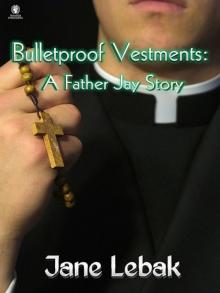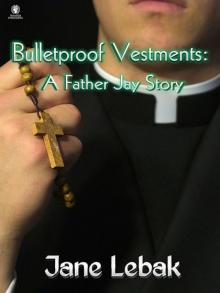- Home
- Jane Lebak
The Wrong Enemy Page 23
The Wrong Enemy Read online
Page 23
“I’m glad you’re pleased. Now you can go.”
The demon turned about, examining himself as though modeling a designer dress. “It fits my soul. Come to think of it,” and he looked up, “it fits yours too, you short-sighted assassin! Sacrificing your son for a second or two of freedom... Living on the back of forgiveness you don’t deserve... Reduced to interfering—”
Tabris blasted the demon, knocking him to the ground and sending his sword across the floor. He formed up his own sword and struck before the demon could call his back to his hand.
The demon took the first blow and then, armed again, returned the fight. Tabris unleashed everything, everything—not just his sword, but his will, his energy, and although the demon defended, he kept yielding ground. With Miriael, Tabris had always been conscious he battled an ally. It kept things measured. Not now.
Again and again they clashed, Tabris not slacking his pace even when the demon harmed him. He didn’t care anymore. Relentless, Tabris focused on the demon with an intensity that kept him pinned to the room, and at that point the demon tried blasting away any number of different ways but failed every time.
Tabris tackled the demon, forcing him to the floor. Green fire coursed along his eyes and feathers.
“You lose,” he whispered.
“I lose?” The demon laughed. “Not hardly. I know who you are.”
“And I know who you are, Zeffar. Irrevocable Choices.”
Free Will and Irrevocable Choices. Don’t those two sound as if they belong together?” Zeffar chuckled. “Head or tail of the same coin, and either way, you lose.” He spat in his own blood. “And you chose death.”
Tabris kept him pinned. “I’ve chosen life.”
“You’ve chosen to sacrifice freedom on the altar of obedience.” The demon narrowed his eyes. “These name games are garbage. I shed my name because I refuse the pigeonhole God scooped out for me. I want more.”
Tabris said, “There is nothing more.”
The demon raised his head. “Not for a puppet like you. God knew—God knew all along! Remember His omniscience? He knew you were going to kill Sebastian on his bicycle when he was twelve years old. He knew it. And then not only did He go on to create the both of you, but He matched you up as guardian and charge anyway.”
Tabris’s heart clenched.
The demon relaxed under his hand. “He denied Casifer a guardianship just so He could page the childless angel to the lobby to sweep up the pieces of your victim. He designed a human female to be Sebastian’s breeding partner and let her be widowed.”
Tabris recoiled. “But—”
The demon sat up. “So tell me about this love and dignity. Talk to me about love and free choice. Because I’m just not seeing it here.”
Tabris had gone cold, cold, cold. “But I wasn’t fated to kill him.”
“That’s the worst part! God knew you were going to make that choice, and what did He do? He matched you up anyhow!” Zeffar’s eyes widened. “He gave you a child to kill. He could have given Sebastian to Casifer right from day one. You’d never have noticed! You might have met the kid someday and thought he was interesting, but you’d never have said, That should have been mine. God could have prevented you from doing this just by cutting it off at the pass!”
Tabris let him go. “But then—”
“All He had to do,” Zeffar whispered, sitting up, “was give that boy to another angel. You failed Sebastian, but God failed him first. God could have called you up to Heaven for tea on the day you murdered him. Sent a baby-sitter angel. Oopsie, he fell off his bicycle, scraped his knee, too bad. Even leaving him alone would have been better.” Zeffar opened his hands. “God could have taken the kid’s life the day before. Boom, car crash, no child to murder. But God did nothing.”
Tabris said, “God didn’t do nothing.”
“God did worse than nothing.” Zeffar’s eyes glinted. “God set it up.”
Tabris closed his eyes. Sebastian. God. I wish I’d never had him. But a universe without that curiosity, those quick eyes—no, that was wrong, empty. God loved that boy. I wish I’d never been Created. That worked better. Because if Tabris never existed, then Sebastian couldn’t have been killed by him, and then Sebastian would have been happy, and Elizabeth would have been happy, and Rachmiel would have been happy, even Casifer would have been happy—and maybe God would have been happier too, without one more angel on the dole to leave the world an unfinished symphony.
Zeffar said, “So that’s love and personal dignity for you. Sorry. I prefer the irrevocable choices. Put me in Hell. At least I have no illusions that God cares.”
If Tabris had been bleeding before from his body, he bled out now from his soul. The betrayal, the futility: if God had known it all along, and still matched them together—but He had known it all along, had matched them together. Had created them for one another. And from the beginning, there had never been a choice?
“There had to have been a choice,” Tabris whispered.
Zeffar got to his feet and dusted off. “If God knows in advance, how much choice could you have had? From where I’m standing, there was one road. He put you on it.”
Tabris hit his knees and stared at the blood freezing to the floor. His, Zeffar’s—it might as well have been Sebastian’s.
Sebastian. And himself. The two best gifts God had ever given him. And now to discover they hadn’t been gifts at all. More like curses.
And the only possible response—return a curse for a curse. Nothing left but to tell God it was over, all done playing games with eternal pawns, goodbye forever. Goodbye. I loved you, but goodbye.
Eyes closed, he reached for Zeffar’s hand, and it closed around his own. The betrayal—God laughing at him in an impossible situation, giving him a gift in order to snatch it back and still expecting to be thanked for it.
The words formed in his mind: You never loved me, but you made me love you. He didn’t think them toward God, but they burned to be said. Ready. I want nothing more to do with you. The final ones would be, I reject you.
After all that, after God did that—no other possible choice.
No.
Zeffar’s hand tightened.
No, this was wrong. On a cliff-top overlooking the Pacific, Rachmiel had said something. The Spirit had been inside Rachmiel, and Rachmiel had spoken. Thus says the Lord. But what had he said...? And was it true?
Head tucked down, Tabris slipped free his hand and clutched it to his chest. His voice was hollow. “God wanted me to make a decision.”
Zeffar crouched before him. “Right!”
“But—” Tabris raised his head to look the demon in the eyes. “He wanted me to make choices. To shape myself, grow myself.”
Zeffar said, “And he wanted this?”
“He wanted me to become.” Tabris shook his head. “The growth was important. My own participation. My responses.” He closed his eyes. “I’m not saying they were good. I’m saying they were mine, and that’s what God wanted when He created Free Will.”
Zeffar gestured outside. “And that rotting body in a Los Angeles cemetery...?”
Tabris shuddered as he got to his feet. The poor kid. In a thousand years, he could never make that right. “I offended Him and disgusted Him with that choice. I was wrong. But God taking away the opportunity to grow badly is the same as taking away my identity.”
Zeffar said, “And who gets hurt?”
“We all get hurt! The whole Body of Christ gets hurt!” Tabris opened his hands. “Knowing you’d leave, He still gave you the freedom to go. What if God had seen you’d be suffering in Hell and decided not to let you? Just had you get distracted by your music that day, and when you left the practice room, you were stuck in Heaven with a psalm on your lips?”
Zeffar kicked a puddle of blood, spraying it on the walls. “He could make me. It wouldn’t mean anything.”
Tabris leaned forward, wings raised. “That’s what I mean! You decided. I decided. God m
ade us with free will because to make us without it meant He wasn’t making us at all. And here we are, the end product of a thousand decisions made moment by moment.”
Zeffar said, “But—”
Tabris said, “And I’m making one more decision. An irrevocable one.”
Zeffar’s eyes flared. “Wait!”
“I’m done with you.”
“Tabris, please!” The demon’s eyes gleamed with tears. He projected in staccato bursts: don’t do this, don’t expel him, they were friends. “Please! I can’t lose you again!”
Tabris opened his heart, and he shoved forward with the exorcism formula he’d recited so often as a soldier. Begone, spirit of darkness and enemy of my God—
Zeffar vanished before he finished. Even the feel of him evaporated from the room.
Tabris crumpled to his knees. God, that was too close.
As silence pervaded the room and the blood began vanishing from the floor, Tabris felt Zeffar’s argument coming back to him: God had created him and Sebastian both. God had meant them for each other, even knowing the outcome. God set it up.
No. Quit that. God had given the gift. It was up to Tabris to do with it what he could. Whatever he decided.
Tabris tilted back his head, looking at the ceiling he hadn’t seen in...thirteen years? Longer. While he watched, some demonic residue on the ceiling curled on itself and popped out of existence. The place would get clean in time. Time.
Time had only mattered when it mattered to Sebastian, and after that it had become an obsession. Moments that once had flooded from somewhere into somewhere else had transformed into mystery when inhabited by a changing creature he loved. Seconds meant more to a creature who perished after a finite number of them, saved in the boxes of the mind. Hoarded. Cherished. Feared.
Back then, Tabris had begun counting future moments he could spend with Sebastian. I wanted to bring him here. I still will, if he lets me. All the things they could have done together, the milestones as important to Tabris as the oatmeal breakfasts.
How long had eternity been before Sebastian? Creationists argued with evolutionists about six days or six billion years, and Tabris had listened in confusion. He’d forgotten the time it had taken and remembered only that God’s hand had manufactured the pieces that made up space and fit them one into the next to create a seamless garment for the creatures He’d called His sons.
But now the future moments couldn’t be counted. How long would it be until the next time he saw Sebastian? Or was eternity just too long to measure without him? An enthralling pain had come with seeing him again. Only God could wound him deeper, but because it was him, because it was Sebastian, Tabris would let him. If Sebastian needed him there, there he would be.
If the kid wanted him.
“I wish I knew,” Tabris whispered to the interior of the cabin. The oak logs shone in the light reflecting off the snow, and Tabris took in the fireplace, the joints in the corners, the hand-knotted rug patterned on one he’d seen while deployed on Earth. With eternity to furnish the place, he hadn’t hurried. What did he need, anyway? Even having a homebase hadn’t seemed important at first because anything he needed he’d always carried with him. Like God’s love. And later, his own care for Sebastian.
“I should undo that dream.” His voice echoed. He ought to fill this place with something, make it less empty. A minute after walking in, Elizabeth would have dropped her coat on the floor, left her hat near the window while looking outside, and then dumped a pile of debris from her school bag over in the corner. After she’d left, Tabris would have found pencils and scraps of paper for days even as the plushness of her heart lingered in the walls. But forever after, a specific emptiness always would ghost it. A home never filled with all that should have.
If Sebastian ever stopped by, it would be nice to have a place prepared for him. A place to sit. A place to talk. They didn’t need to eat in Heaven, but he could scramble up a table and a couple of chairs. Sit facing each other and then listen to all the reasons Sebastian despised him.
A spotlight focused on Tabris’s soul, an attention he’d never fail to recognize. He bowed his head, whispering, “Gloria in excelsis.” And then, unable to stop the smirk, Tabris added, “Would you like me to find a chair for you?”
No, here on the floor was just fine.
Tabris lowered his gaze. “Thank you. Thank you for visiting, and thank you for having Rachmiel explain things this morning. I wouldn’t have withstood Zeffar’s attack otherwise.”
Inside, Tabris sensed that God was thankful that Tabris had opened up enough to listen.
Tabris kept his head down.
God asked a question: was he angry at Sebastian?
“Of course not.” Tabris double-checked his own heart, but he couldn’t find anything resembling anger at Sebastian. No resentment, nothing like that. “I’m sure.”
The follow-up question: then whom was he angry at?
“Myself.”
And anyone else?
Tabris said, “I’m not angry at Rachmiel any longer. Who else is there to be angry at?”
Was he angry at God?
“No.” Tabris closed his eyes. “No. I love you.”
“You need to answer that more thoroughly.” God’s voice became clearer in his mind. “You don’t come to me anymore.”
“I can’t.” Tabris looked out the window again. That brittle cliff. The clouds like lines slicing up the sky. “You understand why.”
He became intensely aware of the log cabin: tiny; chilly; stained with blood and the residue of angelic power. He got the message: God could enter any place, no matter the size or the dirt, if one of His children needed Him.
“It’s not a question of can’t,” Tabris said. “It’s about fittingness. You deserve better.”
“I’ll decide what I deserve.”
Tabris said, “I want to give you more than that, and I’m not a house.”
God said, “You’re better than a house.”
Tabris decided not to dispute that. Better and worse at the same time—houses didn’t sin. If a house collapsed, you wouldn’t blame the center beam for wanting to kill the owner. You could clean a house. If you tired of it, you could get rid of it. You could leave it alone for thirteen years and come back to find it unchanged. And for its own part, the house would wait for you without becoming impatient.
God replied, “So will I.”
Tabris flinched. “Am I that bad?”
“Come home,” said God.
“And if I think I can’t?” Tabris’s voice pitched up, and he realized in his own way he was playing Sebastian to God. “You gave me one ridiculously simple thing not to do, and I did it.”
God replied, “You mean like, Don’t eat that fruit over there?”
Tabris folded his arms and turned his head. “The fruit of another tree resolved that barrier for them.”
God said, “Ask yourself why you’re so invested in holding out.”
“Why did you do this?” His heart pounded. “I sent Zeffar away, but I want to know— Why did you still make both of us?”
God said, “You yourself said the universe would be poorer without Sebastian in it.”
Tabris said, “But me? If you’d made the universe without me, Sebastian would have been taken care of. He’d never have missed me. No one would have.”
God replied, “I would have missed you.”
No, You wouldn’t— Except God wouldn’t lie, so Tabris had to look that uncomfortable thought full in the face: God wanted him. God would have been sad not to have created him.
God pointed his mind back to the last question: why he was so invested in holding out.
Reasons. You needed a reason to build a wall. A boundary. This far and no further. Fences. Neighbors.
“If you want,” but it hurt, even that much hurt, “I’ll let you in. Just for now. A little.”
The spotlight feeling diffused into a sensation through the entire angel. Don’t be afrai
d. Take your time. Don’t feel pressured or hopeless. Whenever he wanted God inside his heart, God would be ready.
Tabris swallowed hard because—six months ago was the last time he’d felt that presence inside, and he craved it. How many times had he seen Rachmiel reach for God on reflex and brighten when God responded? He’d held back at first because he didn’t want to be rejected, and here God was as good as telling him he wouldn’t be. So why not do it? Get it over with. Just reach out and take whatever God returned.
Except for the fittingness part.
Why are you so invested in holding out?, God had asked.
God was waiting. He shouldn’t put God through that. It was selfish.
God said, “Don’t project your pain onto me. You’re identifying yourself with Sebastian and then me with you. I want you home, but when you’re ready. Aren’t you doing the same with the child?”
Tabris said, “The prodigal son’s father ran out to meet him on the road, but he didn’t follow him into the distant land. Is that why?”
God said, “If you choose me, I’ll help you every step of the way. But if you run, you can leave.”
Tabris said, “Free will.”
God said, “Irrevocable choices.”
“If I asked whether Sebastian will come back to me, would you answer?”
“I would tell you that he’s been praying for both himself and for you.”
Maybe that was the reason Tabris hadn’t succumbed to Zeffar. Prayers for your enemies covered a multitude of evils.
Tabris said, “Tell him thank you for me. If he wants to hear it.”
When God didn’t reply, Tabris let the throbbing in his heart consume his attention. After six months, God’s love left him feeling awkward and Rachmiel’s left him suspicious. But he’d loved himself before last autumn, and he’d known himself since the beginning. Sebastian had never met him before yesterday, hadn’t known more than his title and the end result of their professional relationship
Tabris had no choice but to deal with himself; eventually he’d reach a state of truce. But if after six months Tabris still despised himself, what were the odds Sebastian wouldn’t be doing the same six months from now? Six years?

 Bulletproof Vestments
Bulletproof Vestments The Wrong Enemy
The Wrong Enemy The Boys Upstairs (Father Jay Book 2)
The Boys Upstairs (Father Jay Book 2) Sacred Cups (Seven Archangels Book 2)
Sacred Cups (Seven Archangels Book 2) Bulletproof Vestments: A Father Jay Story
Bulletproof Vestments: A Father Jay Story An Arrow In Flight (Seven Archangels Book 1)
An Arrow In Flight (Seven Archangels Book 1) Upsie-Daisy
Upsie-Daisy Shattered Walls (Seven Archangels Book 3)
Shattered Walls (Seven Archangels Book 3) Pickup Notes
Pickup Notes